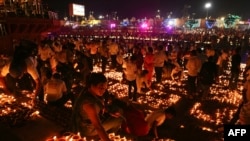ໃນຂະນະທີ່ ອິນເດຍ ກຳລັງເລັ່ງກຽມຈັດງານບຸນ ດີວາລີ (Diwali) ຫຼື ບຸນໄຕ້ ທຽນໄຟຂອງສາສະໜາຮິນດູ ເຊິ່ງປະຊາຊົນມີຄວາມເຫັນທີ່ແຕກຕ່າງກັນ ກ່ຽວກັບວ່າ ພວກເຂົາຄວນສະເຫຼີມສະຫຼອງດ້ວຍການຈູດໝາກກະໂພກຫຼືບໍ່ ເຊິ່ງຈະເຮັດໃຫ້ມົນລະພິດໃນອາກາດທີ່ຍືດເຍື້ອຍາວນານນັ້ນໜັກຂຶ້ນກວ່າເກົ່າ ອີງຕາມລາຍງານຂອງອົງການຂ່າວເອພີ.
ບຸນ ດີວາລີ ເຊິ່ງຈະມີການສະເຫຼີມສະຫຼອງກັນໃນວັນພະຫັດມື້ນີ້ ຖືກສະເຫຼີມສະຫຼອງໂດຍການພົບປະສັງສັນ ແລະ ແລກປ່ຽນຂອງຂວັນກັນພາຍໃນຄອບ ຄົວ ແລະໝູ່ເພື່ອນ. ຊາວອິນເດຍຫຼາຍໆຄົນຈະພາກັນໄຕ້ທຽນ. ແຕ່ໃນແຕ່ລະປີ ເທດສະການດັ່ງກ່າວນີ້ ໄດ້ມີຄວາມເປັນຫ່ວງກ່ຽວກັບມົນລະພິດໃນອາກາດ ຂະນະທີ່ຄວັນທີ່ເກີດຈາກການຈູດໝາກກະໂພກນັ້ນ ກາຍເປັນຄວັນພິດທີ່ສາ ມາດໃຊ້ເວລາຫຼາຍມື້ຈຶ່ງຈະຫຼາຍໄປ.
ນະຄອນຫຼວງນິວເດລີ ເຊິ່ງເປັນນຶ່ງໃນຫຼາຍໆຫົວເມືອງທີ່ມີຄຸນນະພາບອາກາດ ທີ່ບໍ່ດີເລີຍ ໂດຍສະເພາະຜົນກະທົບຈາກບັນຫາດັ່ງກ່າວ ແລະ ມັກຈະຖືກປົກ ຄຸມໄປດ້ວຍຄວັນພິດສີເທົານຶ່ງມື້ຫລັງຈາກບຸນ ດີວາລີ. ທາງການຢູ່ທີ່ແຫ່ງຕ່າງໆ ແລະຢູ່ໃນລັດອື່ນໆ ໄດ້ຫ້າມການໃຊ້ ແລະຂາຍໝາກກະໂພກ ນັບຕັ້ງແຕ່ປີ 2017 ເປັນຕົ້ນມາ ໂດຍຂໍໃຫ້ປະຊາຊົນຫາທາງເລືອກອື່ນທີ່ເປັນມິດຕໍ່ສະພາບ ແວດລ້ອມແທນການຈູດໝາກກະໂພກ ແລະຈັດງານສະແດງແສງໄຟເປັນຕົ້ນ ແຕ່ກົດລະບຽບດັ່ງກ່າວສ່ວນຫຼາຍຈະຖືກລະເມີດ. ໝາກກະໂພກ ສາມາດຊື້ໄດ້ ຢ່າງງ່າຍດາຍຈາກຮ້ານນ້ອຍທີ່ຕັ້ງຢູ່ຕາມແຄມທາງຫຼືຢູ່ຮ້ານຄ້າທົ່ວໄປ.
ພົນລະເມືອງບາງສ່ວນໃນນະຄອນຫຼວງນິວເດລີ ກ່າວວ່າ ການຫ້າມບໍ່ເຮັດໃຫ້ມີ ການປ່ຽນແປງຫຍັງເລີຍ ໃນຂະນະດຽວກັນຄົນອື່ນໆເຫັນວ່າ ມັນເປັນມາດຕະ ການທີ່ຈຳເປັນເພື່ອຕໍ່ສູ້ກັບມົນລະພິດ.
ນາງ ເຣນູ ເປັນຄົນຂາຍຜັກ ຜູ້ທີ່ໃຊ້ພຽງຊື່ດຽວ ມັກການສະເຫຼີມສະຫຼອງບຸນ ດີວາລີ ຫຼາຍຢູ່ໃນຕົວເມືອງ. ໃນແຕ່ລະປີລູກເຕົ້າຂອງນາງ ຈະພາກັນຈູດ ໝາກກະໂພກໃນຕອນກາງຄືນ. ນາງບອກພວກລູກໆໃຫ້ລະມັດລະວັງ ແຕ່ບໍ່ໄດ້ຫ້າມພວກເຂົາບໍ່ໃຫ້ຈູດມັນ.
ນາງໄດ້ກ່າວວ່າ “ບຸນດີວາລີ ເປັນວັນແຫ່ງການສະເຫຼີມສະຫຼອງ ແລະ ຄວາມສຸກສຳລັບພວກເຮົາ ເຊິ່ງເກີດຂຶ້ນພຽງມື້ດຽວຕໍ່ປີ ແລະຂ້ອຍຮູ້ສຶກວ່າ ການຫ້າມ ນັ້ນ ບໍ່ຄວນມີອອກມາ.”
ສ່ວນຄົນອື່ນໆ ແມ່ນບໍ່ເຫັນດີນຳຄວາມເຫັນດັ່ງກ່າວ.
ບໍ່ຄືພວກເດັກນ້ອຍສ່ວນຫຼາຍ, ນາງ ຣູຮານນີ ມານດາລ ອາຍຸ 13 ປີ ບໍ່ຈູດ ໝາກກະໂພກເລີຍ. ນາກຮັບຮູ້ວ່າ ມັນມ່ວນ ແຕ່ນາງກ່າວວ່າ ມັນເປັນໄພອັນ ຕະລາຍສຳລັບຄົນ ແລະສັດຕ່າງໆ.
As India gears up for Diwali, the Hindu festival of lights, people are divided over whether they should celebrate by setting off firecrackers, which worsen the country's chronic air pollution.
Diwali, which will be celebrated Thursday, is marked by socializing and exchanging gifts with family and friends. Many Indians light earthen oil lamps or candles. But every year the festivities are tinged with worries over air pollution, as smoke-emitting firecrackers cause toxic smog that can takes days to clear.
The capital, New Delhi, which is among India's worst cities for air quality, is particularly impacted by the problem and is usually shrouded in toxic gray smog a day after Diwali. Authorities there and in some other states have banned the use and sale of firecrackers since 2017, asking people to opt for more sustainable options like environmentally friendly firecrackers and light shows, but the rule is often flouted. Firecrackers can be easily bought from roadside stalls and stores.
Some residents in New Delhi say the ban doesn't make much difference, while others see it as a necessary measure to fight pollution.
Vegetable vendor Renu, who only uses one name, loves celebrating Diwali in the city. Every year her kids set off firecrackers at night. She tells them to be careful but not to refrain from using them.
"Diwali is a day of celebration and happiness for us which comes only once a year, and I feel the ban should not be there," she said.
Others are against it.
Unlike most kids, Ruhaani Mandal, 13, doesn't light firecrackers. She acknowledges it is fun, but says it is hazardous for people and animals.





ຟໍຣັມສະແດງຄວາມຄິດເຫັນ